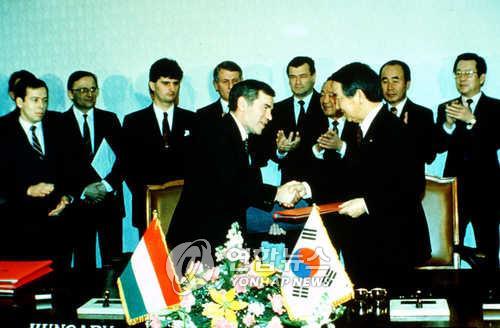 |
This file photo, taken Feb. 10, 1989, shows then South Korean Foreign Minister Choi Ho-joong (right) shaking hands with his Hungarian counterpart, Gyula Horn, after establishing the two countries` diplomatic relations. (Yonhap) |
South Korea provided a massive bank loan to establish diplomatic relations with Hungary in 1989, a declassified diplomatic document revealed Tuesday.
Seoul pledged Budapest an economic cooperation fund of $650 million that combined direct investments, loans and other financial support, according to the agreed-upon minutes dated August 1988.
Of the total $250 million in bank loans, Seoul was asked to execute half of the amount, or $125 million, as a precondition to the forging of diplomatic relations.
In December 1988, eight banks in Korea signed loan contracts with Hungary’s central bank. On Feb. 1 the following year, Hungary became the first country in Europe’s Eastern Bloc to form formal ties with Seoul.
Seoul’s Foreign Ministry released files from 1988-1989 to the public, in an annual unsealing of 30-year-old diplomatic documents. The 240,000-page archive sheds light on then-President Roh Tae-woo’s signature “Nordpolitik” policy aimed at establishing diplomatic ties with socialist countries that were traditional allies of North Korea.
The revealed documents backed up the widely held view that the economy was the major motive behind Budapest’s opening up to Seoul, at the cost of hurting its long-held ties with Pyongyang.
During the negotiation, Hungary had initially demanded $1.5 billion as a prerequisite for diplomatic relations, while South Korea countered with $400 million. Hungary then came down to $1 billion and then to $800 million, before the two parties settled at $650 million, according to a handwritten report by the Korean negotiating team, led by Park Chul-un, then the South Korean presidential policy aide.
Before entering the negotiation, Seoul was concerned it would set a bad precedent and other countries that it was seeking to partner with could make similar demands. Later that year, South Korea provided $450 million in economic aid to Poland when it established relations in November 1989.
The declassified documents, which also include negotiations in the Uruguay Round, establishing a partnership with the Association of Southeast Asian Nations countries and repatriation of the Sakhalin Koreans, among others, are available to view at the ministry’s Diplomatic Archives in southern Seoul -- which is currently closed due to the COVID-19 outbreak -- or the archive’s
website.
By Ahn Sung-mi (
sahn@heraldcorp.com)








